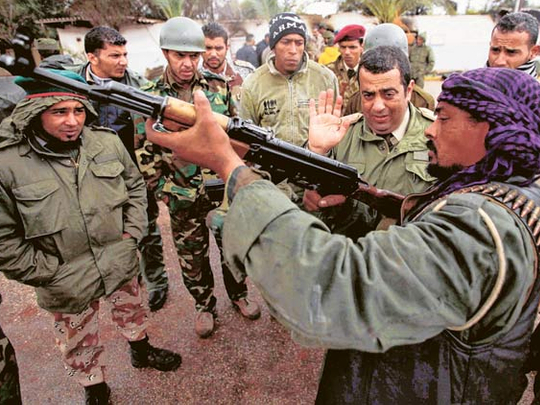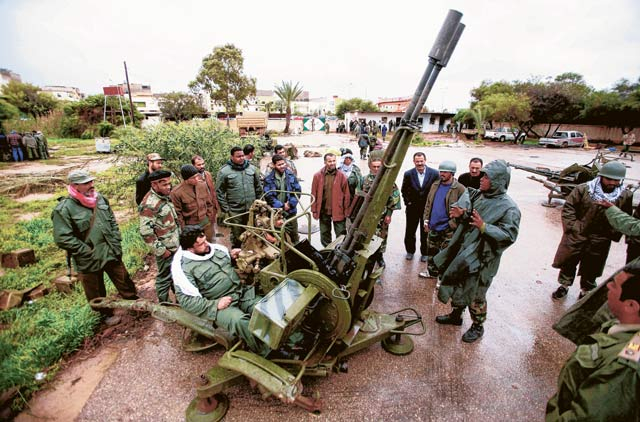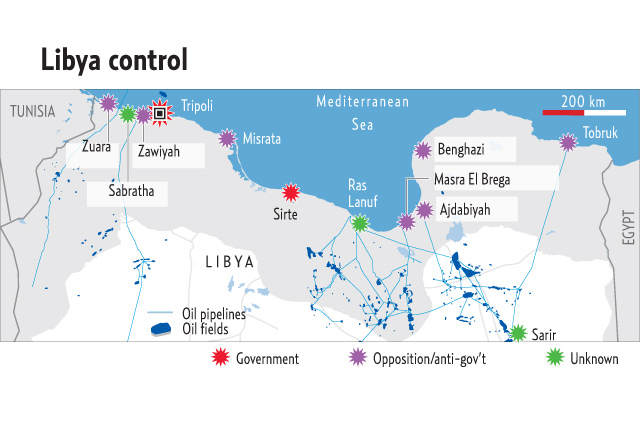
The Hague: The prosecutor of the International Criminal Court (ICC) on Monday announced a preliminary probe of possible crimes against humanity committed in Libya, after a referral by the United Nations.
He was "assessing allegations of widespread or systematic attacks against the civilian population," prosecutor Luis Moreno-Ocampo told journalists in The Hague, adding "this could constitute crimes against humanity and must stop".
The office of the prosecutor will decide "within a few days", after completing this preliminary assessment, whether or not to launch a full investigation of alleged crimes committed in Libya since February 15, he added.
This would enable prosecutors to "collect evidence and request an arrest warrant against those identified as the most responsible. The judges will then decide based on the evidence."
Moreno-Ocampo promised that the court would move "swiftly and impartially," saying, "There will be no impunity for leaders involved in the commission of crimes."
The UN Security Council on Saturday referred the situation in Libya to the ICC, saying "the widespread and systematic attacks currently taking place against the civilian population may amount to crimes against humanity."
Libyan security forces have cracked down on protests that started nearly two weeks ago against the 41-year regime of Muammar Gaddafi.
The unrest has killed at least 1,000 people and set off a "humanitarian emergency", the UN refugee agency UNHCR said, as almost 100,000 people, mostly migrant workers, fled the North African state.
"If people were in a square and were attacked by tanks, planes and soldiers, and if people were killed in a systematic way, this was a crime against humanity," said Moreno-Ocampo.
The ICC is the world's only independent, permanent tribunal with the jurisdiction to try genocide, crimes against humanity and war crimes.
This is the second time that the UN Security Council refers a case to the ICC; the first was alleged human rights violations committed in Darfur.
That referral led to warrants of arrest being issued against Sudanese President Omar Al Bashir for genocide, war crimes and crimes against humanity.
In most cases, the court opens its own investigations or has them referred by signatory states to its founding Rome Statute, which Libya is not.
Anti-regime forces take west Libyan towns
Forces opposed to Muammar Gaddafi took control of several western Libyan towns, an official said on Sunday as the strongman played down such reports after world leaders called on him to quit.
Protest leaders, meanwhile, established a transitional "national council" in mainly eastern cities seized from the Gaddafi regime and called on the army to help them take the capital Tripoli.
The chaos engulfing the oil-rich North African state of 6.3 million has fanned fears that Gaddafi's hold on power could descend into civil war as the United Nations said nearly 100,000 people have streamed out of the country.
The UN Security Council imposed a travel and assets ban on Gaddafi's regime and ordered an investigation into possible crimes against humanity by the Libyan leader, the first time such a decision has been made unanimously.
At least 1,000 people have been killed in a crackdown by security forces over the past two weeks, Liyban and international diplomats have said.
In Washington, US Secretary of State Hillary Clinton said the United States was prepared to offer "any kind of assistance" to Libyans seeking to overthrow Gaddafi.
On Saturday, former justice Mustafa Abdul Jalil, who quit Gaddafi's regime six days ago, told Al Jazeera television a transitional government would be formed to lead the country before an election.
On Sunday, a spokesman announced the creation of a transitional "national council" in cities seized from Gaddafi's forces.
"The creation of a national council has been announced in all freed cities of Libya," Abdul Hafiz Goqa told a Benghazi news conference.
The council is the "face of Libya in the transitional period," he said, adding that consultations were under way on the new body's composition and duties.
"The people of Libya will liberate their cities," Goqa said. "We are counting on the army to liberate Tripoli."
In neighbouring Egypt, visiting US senators John McCain and Joe Lieberman urged Washington to recognise a transitional government in Libya and provide it with weapons and humanitarian assistance to oust Gaddafi.
In a telephone statement aired Sunday by Serbia's Pink television, Gaddafi said there was currently no unrest in Libya, while blaming Al Qaida extremists for the killings in his strife-torn country.
"There are no incidents at the moment and Libya is completely quiet. There is nothing unusual. There is no unrest," Gaddafi said in a 10-minute statement.
"People were killed by terrorist gangs and they are without a doubt Al Qaida," the Libyan leader added.
But Gaddafi's crumbling regime now controls only some western areas around the capital and a few long-time bastions in the arid south, reporters and witnesses say.
An AFP reporter arriving in Nalut, a town of 66,000 people, 235km west of Tripoli, found loyalist Gaddafi forces had entirely disappeared.
"The city has been liberated since February 19. It has been run by a revolutionary committee named by the town's communities," Shaban Abu Sitta, a local lawyer and member of a revolutionary committee, told AFP.
"The towns of Rhibat, Kabaw, Jado, Rogban, Zentan, Yefren, Kekla, Gherien and Hawamed have also been free for days. In all these towns, Gaddafi's forces have gone and a revolutionary committee put in place," he said.
Regime opponents appeared to control the city of Zawiyah, 50km west of Tripoli, where thousands took to the streets to denounce the teetering leader in front of journalists on a guided visit.
The journalists were welcomed by thousands of demonstrators, shouting "Down with the regime, we want freedom." Some were armed and fired into the air.
No Libyan security services were visible, but Zawiyah saw clashes between regime supporters and opponents last Thursday, in which a human rights group said more than 35 people were killed.
Fears of all-out conflict as diehard loyalists mount a desperate rearguard action prompted countries to evacuate tens of thousands of citizens and close embassies.
US President Barack Obama said Gaddafi needs to "leave now," having lost the legitimacy to rule, in a call echoed by leaders in Britain, Germany and Italy.
Gaddafi downfall
Italian Foreign Minister Franco Frattini said Gaddafi's downfall was just a question of time. "It's inevitable that this will happen... I think we are at a point of no return," he said.
UK freezes assets
Britain said it revoked Gaddafi's diplomatic immunity and froze the assets the strongman and his family have held in the European country, as Foreign Secretary William Hague said his departure would be the "best hope" for Libya.
Residents of Tripoli said banks were open but bread and petrol remained tightly rationed as the rebel grip on large swathes of the vast desert nation played havoc with the distribution of goods.
The authorities sent text messages urging families to accept an offer, announced by state television on Friday, of a 400-dollar handout for every family.
"This is only for Tripoli, they are trying to bribe the people," one resident told AFP.
Tanks and jeeps driven by regime partisans were patrolling almost deserted neighbourhoods around the capital, residents said.
"This escape of mine makes me feel I am in heaven," said Mohammad Sali, 63, an engineer in the first batch of Indian evacuees to return home.
The Security Council also voted to order an investigation into possible crimes against humanity by the Libyan regime, as well as an arms embargo, and travel bans against Kadhafi and his family and inner circle.
The Council said it was referring the bloodshed to the International Criminal Court because "the widespread and systematic attacks" in Libya against civilians "may amount to crimes against humanity."
The United Nations says that more than 1,000 people have been killed in the crackdown by Gaddafi loyalists.
Libya's foreign legion of domestic helpers, construction workers and oil executives were among thousands scrambling out by air, land and sea.
The UN refugee agency said on Sunday that a "humanitarian emergency" was under way.
The UNHCR said almost 100,000 migrant workers, mostly from Egypt and Tunisia, have fled Libya in the past week and many remain stranded at the Libya-Tunisia border as Libyan customs officers deserted their posts.














